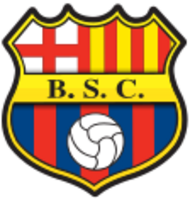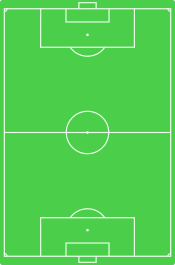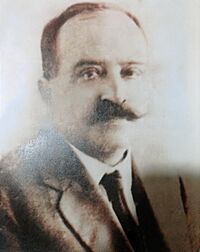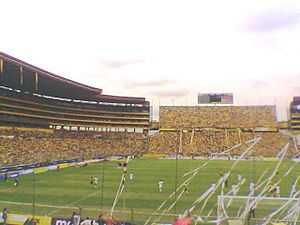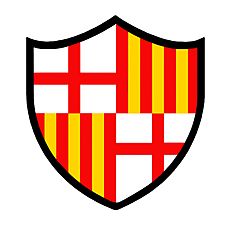Barcelona S.C. facts for kids
Barcelona Sporting Club, often called Barcelona de Guayaquil, is a famous sports club from Guayaquil, Ecuador. It is best known for its professional football team. The team plays in the Ecuadorian Serie A, which is the top football league in Ecuador. Barcelona SC is the only club in this league that has never been moved down to a lower division, like Serie B.
Barcelona Sporting Club is one of the most successful football teams in Ecuador. They have won the Serie A title a record 16 times, with their most recent win in 2020. They also won six regional titles. Barcelona SC was the first Ecuadorian club to reach the finals of the Copa Libertadores, which is a huge South American tournament. They made it to the finals twice but did not win.
The club was started on May 1, 1925, by Eutimio Pérez, who was from Spain. He named the club after his hometown, Barcelona. Since then, Barcelona Sporting Club has become the most popular club in Ecuador. They have a big rivalry with Emelec. Games between these two teams are called "El Clásico del Astillero" and are the most important derby in Ecuador. Barcelona SC plays its home games at Estadio Monumental Banco Pichincha, which is the biggest stadium in the country.
Besides football, Barcelona SC also has teams in other sports. These include basketball, bowling, boxing, swimming, volleyball, baseball, athletics, and tennis. In 2008, their basketball team won the Ecuadorian National Basketball League championship.
Contents
Club History
How Barcelona SC Started (1925–1969)
Barcelona Sporting Club's 1st squad of 15 June 1925. The coach was Eutimio Pérez.
Barcelona Sporting Club was founded on May 1, 1925. Eutimio Pérez, a Spanish immigrant, named the club after his home city of Barcelona, Spain. The team's crest, which looks a bit like FC Barcelona's, was adopted later.
The team first played in an amateur tournament in the Guayas Province. In the 1940s, Barcelona became very popular. This was partly because they played exciting matches against strong Colombian teams like Deportivo Cali and Millionarios. Barcelona even beat Millionarios twice in Guayaquil.
It's interesting that Barcelona SC was formed in the same area where their biggest rival, Club Sport Emelec, was also founded. Both clubs started in the Astillero neighborhood of Guayaquil.
In 1950, Barcelona SC won its first amateur title. The next year, the league became professional. Between 1951 and 1967, Barcelona won five professional regional titles. In 1957, Barcelona was invited to play in the new Serie A de Ecuador national championship. They finished second in their first try. Barcelona won its first national title in 1960. This made them the first Ecuadorian team to play in the Copa Libertadores.
- First match: June 15, 1925, against Ayacucho (Barcelona won 1–0).
- First international match: March 19, 1931, against
 Deportivo Cali (a 4–4 tie).
Deportivo Cali (a 4–4 tie).
Rise to Fame (1970s)
By the 1970s, Barcelona was one of Ecuador's most popular teams. They had won many championships in their province and nationally. However, they hadn't done very well in the Copa Libertadores.
This changed in 1971. They reached the semi-finals with a team of amazing players. These included Brazilian player Jose Paes, Peruvian World Cup player Pedro Pablo León, and Ecuadorian legend Alberto Spencer. They didn't reach the finals, but they did something incredible. They beat Estudiantes de La Plata 1–0 in their home stadium. Estudiantes had been undefeated at home for four years in the Copa Libertadores. This win is known as La Hazaña de la Plata (The Feat of La Plata). In 1972, they reached the semi-finals again, showing they were a strong international team.
After 1972, the club went through a tough period. They didn't win a national title or qualify for the Copa Libertadores for nine years.
Coming Back Strong (1980s)
In the 1980s, Barcelona SC made a big comeback. In 1980, they won their first national title since 1971. They went on to win four more titles before the end of the decade. This made the 1980s their most successful time for national championships. Barcelona became the first Ecuadorian team to win 10 national titles.
During this time, Barcelona played in the Copa Libertadores six times. They reached the semi-finals twice, in 1986 and 1987. In 1988, they played a special friendly match against FC Barcelona from Spain, which has the same name. The Ecuadorian Barcelona won 2–1!
In 1987, Barcelona opened their new home stadium, the Estadio Monumental. It was built to hold almost 90,000 fans. It was the largest stadium in Ecuador and the second-largest in South America at the time. Its capacity is now around 60,000 for safety reasons.
The Golden Years (1990s)
In 1990, Barcelona SC wanted to win the Copa Libertadores for the first time. They brought in top international players. These included Argentine World Cup winner Marcelo Trobbiani, Argentine player Alberto Acosta, and Uruguayan player Marcelo Saralegui. With these new players and talented Ecuadorian players, they had a fantastic tournament.
In the 1990 Copa Libertadores, Barcelona beat River Plate from Argentina in a penalty shootout. This finally took them to the long-awaited final! Sadly, they lost to Olimpia from Paraguay. Many fans felt the referee's decisions affected the game.
In 1992, they built another great team. They beat the previous champions, Colo-Colo from Chile. They reached the Libertadores Cup semi-finals again. But they lost to the strong Brazilian team São Paulo, which had famous players like Cafu and Raí.
This decade also had a sad moment. On December 26, 1993, Ecuadorian striker Carlos Muñoz died in a car accident at just 26 years old. This happened three days after Barcelona had finished second in the Ecuadorian league.
After winning the Ecuadorian league title in 1997, they played in the 1998 Libertadores Cup. Even with older players, they surprisingly reached their second Libertadores Cup final. However, they lost both games to the Brazilian team Vasco Da Gama.
The 1998 final was their last appearance in the Copa Libertadores final. Many fans were disappointed because they really wanted to win a continental title. Instead, their rivals L.D.U. Quito became the first Ecuadorian team to win the Copa Libertadores in 2008.
A Period Without Titles (1998–2012)
Barcelona did not win a national title for 15 years after 1997. They only played in the Copa Libertadores twice in the 2000s. Even without titles, the club remained one of the most successful teams in the league. They finished as runners-up three times during this period.
Barcelona continued to provide many players to the Ecuador national team. They also remained one of the most popular teams in Ecuador. The derby against their rival Emelec is still the most popular football rivalry in Ecuador.
New Leadership and Challenges (2007–2011)
In November 2007, Eduardo Maruri became the president of Barcelona. He and the vice president promised to bring in top players and fix the club's problems. However, the 2009 season was Barcelona's worst ever in the Serie A. Other teams worried that if Barcelona was moved down to a lower league, it would hurt their own finances. This was because Barcelona had the most fans, and games against them almost always sold out.
On October 3, 2009, over 70,000 fans came to the Estadio Monumental Banco del Pichincha to support their team. They wanted to make sure Barcelona would not be moved down. In an exciting match, Barcelona beat LDU Portoviejo 2–0. This win meant Barcelona remained the only Ecuadorian team that has never played in Serie B.
In December 2010, Eduardo Maruri resigned as president. After a few quick changes, Alfonso Harb Viteri became president temporarily. He announced new presidential elections for June 2011.
The Noboa Era (2011–2015)
Antonio Noboa won the presidential election on June 11, 2011. During his time as president, Barcelona finally won the 2012 Serie A title. This ended their 14-year wait for a championship!
The Cevallos Era (2015–Present)
Former goalkeeper José Francisco Cevallos became president of Barcelona on December 13, 2015. His term was renewed in 2020. During his time, Barcelona won the 2016 Ecuadorian Serie A title. This allowed them to play in the 2017 Copa Libertadores. They had a great run, reaching the semi-finals for the first time since 1998. They beat strong Brazilian teams like Palmeiras and Botafogo. They eventually lost to the champions, Grêmio.
Cevallos's term ended with another championship win in the 2020 Ecuadorian Serie A. The next year, Barcelona reached the semi-finals of the 2021 Copa Libertadores again. They topped a very tough group with famous teams like Boca Juniors and Santos. In the knockout rounds, they beat Vélez Sarsfield and Fluminense. They lost to Flamengo in the semi-finals. In the 2022 Ecuadorian Serie A, they won the first part of the season but lost the championship to Aucas.
Team Colors and Badge
The crest, or badge, of Barcelona SC has changed over the years. The first crest looked like a changed version of the city of Barcelona's Coat of Arms. The team used this for two years. In 1935, they used Barcelona's flag inside a circle, with a triangle behind it that had the team's initials.
In 1955, after winning their first Guayas Championship, the team adopted their current crest. It is similar to FC Barcelona's crest. They made changes to it, like the number of spikes, the color of the ball, and the initials.
Uniform Changes Over Time
|
|
|
|
The team's main colors are yellow and red. Since 2015, their home uniform has been all yellow. Before that, the team used to play in black and white kits. For a short time early in their history, they even used a uniform similar to FC Barcelona's. But after many losses in that uniform, the team president decided they would never wear those colors again. In the 1940s, yellow was added and eventually became the team's main color. Red became the second color, used for their away uniforms.
Home Stadium
Barcelona SC has played in three different stadiums. Their first stadium was Estadio George Capwell. They shared it with their rival Emelec because it was the only stadium in Guayaquil.
In 1959, they moved to the new Estadio Modelo in Guayaquil. This was the stadium where the team played during its "golden years." Barcelona shared this stadium with Emelec and Patria for several years.
After the success of Estadio Modelo, Barcelona's president, Isidro Romero Carbo, wanted to build Barcelona its own stadium. He talked with Jaime Nebot, the mayor of Guayaquil, and León Febres Cordero, who was the President of Ecuador at the time. Both were Barcelona fans and decided to help. Nebot donated a large piece of land for construction, and Febres Cordero helped with money.
In 1986, Romero started building the stadium. In 1987, the Estadio Monumental opened for the first time. It was the first stadium in Ecuador to have special suites. It also became the largest stadium in the country, with space for almost 90,000 fans.
Recently, the team made a deal to install a modern LED screen around the field at Estadio Monumental Banco Pichincha. This 243-meter LED screen was put in place in September 2008. It was the first LED screen in an Ecuadorian football stadium. On July 12, 2015, an even bigger LED screen was added. An aerial lift, or cable car, is also being built to connect the stadium to downtown Guayaquil.
Team Supporters
Barcelona SC has the biggest group of fans of any club in Ecuador. According to CONMEBOL, they are the most popular sports club in Ecuador, with over 7 million fans as of April 2016. When Barcelona SC plays away games, many of their fans from that city come to support them.
Barcelona's most passionate fans are known as La Sur Oscura (The Dark South). During home matches, they sit in the southern part of the Estadio Monumental. In Quito, Barcelona's fans are called Sur Oscura Quito. Another group of fans is known as Zona Norte (North Zone).
Team Rivalries
El Clásico del Astillero is a match played against Barcelona's old rival, Emelec. The two teams first played each other on August 22, 1943, in a Guayaquil League match. Barcelona, wearing their yellow jerseys, beat Emelec 4–3. This game is remembered as "The Derby of the Posts" because Emelec's players hit the goalposts so many times.
In 1948, the local newspaper El Universo gave the derby its famous name: El Clásico del Astillero (The Shipyard Derby).
The year 1990 was very special for El Clásico del Astillero. The two teams played each other in a Copa Libertadores quarter-final match on August 29. Barcelona de Guayaquil won 1–0 and moved on to the semi-finals.
The rivalry between these two teams is huge in Ecuador and even internationally. In 1973, a movie called "El derecho de los pobres" was made about it. It starred Spanish-Mexican actor Enrique Rambal and Ecuadorian football legend Alberto Spencer.
On social media, the rivalry is very active. Fans often make funny memes and videos to tease the other team, especially after a game. A common phrase used to show the rivalry is "Barcelona, tu papá." (English: "Barcelona is your father"). This means Barcelona is seen as having a more important position than Emelec in many ways.
This rivalry has become even more important because both teams have been successful recently. Barcelona won in 2012, and Emelec won in 2013 and 2014. The 2014 championship was decided when Emelec beat Barcelona 3–0.
Team Achievements
National Titles
- Serie A
- Winners (16): 1960, 1963, 1966, 1970, 1971, 1980, 1981, 1985, 1987, 1989, 1991, 1995, 1997, 2012, 2016, 2020
International Titles
- Copa Libertadores
- Runners-up (2): 1990, 1998
Regional Titles
- Campeonato Amateur de Guayaquil
- Winners (1): 1950
- Campeonato Amateur División Intermedia
- Winners (1): 1941
- Campeonato Amateur Serie B
- Winners (2): 1940, 1946
- Campeonato Amateur Serie C
- Winners (3): 1934, 1936, 1938
- Campeonato de Fútbol del Guayas
- Winners (5): 1955, 1961, 1963, 1965, 1967
- Copa de Reservas AsoGuayas
- Winners (1): 2006
- Copa Fedeguayas
- Winners (1): 2004
Team Players
Current Squad Members
|
|
Players on Loan
|
|
World Cup Players from Barcelona SC
These players were part of their country's team at the FIFA World Cup while playing for Barcelona SC:
 Antony de Ávila (1998)
Antony de Ávila (1998) Nicolás Geovanny Asencio (2002)
Nicolás Geovanny Asencio (2002) José Francisco Cevallos (2002)
José Francisco Cevallos (2002) Luis Oswaldo Gómez (2002)
Luis Oswaldo Gómez (2002) Iván Jacinto Hurtado (2002)
Iván Jacinto Hurtado (2002) Iván Kaviedes (2002)
Iván Kaviedes (2002) Edwin Tenorio (2002, 2006)
Edwin Tenorio (2002, 2006) Máximo Banguera (2014)
Máximo Banguera (2014) Juan Carlos Paredes (2014)
Juan Carlos Paredes (2014) Luis Saritama (2014)
Luis Saritama (2014)
Team Managers
Current Coaching Staff
| Position | Staff |
|---|---|
| Manager | Segundo Castillo |
| Assistant Manager | Rolando Azas |
| Fitness Coach | Marco Conenna |
| Goalkeeping Coach | Carlos Caicedo |
Last updated: 7 January 2020
Source: El Universo
Famous Managers Who Won Titles
Here are some of the managers who led Barcelona SC to win championships:
 Julio Kellman (won the 1960 Serie A title)
Julio Kellman (won the 1960 Serie A title) Francisco Ferreira de Sousa "Gradim" (won the 1963 Serie A title)
Francisco Ferreira de Sousa "Gradim" (won the 1963 Serie A title) Pablo Ansaldo (won the 1966 Serie A title)
Pablo Ansaldo (won the 1966 Serie A title) Otto Vieira (won Serie A titles in 1970, 1971, and 1980)
Otto Vieira (won Serie A titles in 1970, 1971, and 1980) Hector Morales (won the 1981 Serie A title)
Hector Morales (won the 1981 Serie A title) Luis Santibáñez (won the 1985 Serie A title)
Luis Santibáñez (won the 1985 Serie A title) Roque Gastón Máspoli (won the 1987 Serie A title)
Roque Gastón Máspoli (won the 1987 Serie A title) Miguel Brindisi (won the 1989 Serie A title)
Miguel Brindisi (won the 1989 Serie A title) Jorge Habegger (won the 1991 Serie A title)
Jorge Habegger (won the 1991 Serie A title) Salvador Capitano (won the 1995 Serie A title)
Salvador Capitano (won the 1995 Serie A title) Siu Fong Lee Silvia Heikkila (won the 1997 Serie A title)
Siu Fong Lee Silvia Heikkila (won the 1997 Serie A title) Gustavo Costas (won the 2012 Serie A title)
Gustavo Costas (won the 2012 Serie A title) Guillermo Almada (won the 2016 Serie A title)
Guillermo Almada (won the 2016 Serie A title) Fabián Bustos (won the 2020 Serie A title)
Fabián Bustos (won the 2020 Serie A title)
See also
 In Spanish: Barcelona Sporting Club para niños
In Spanish: Barcelona Sporting Club para niños


